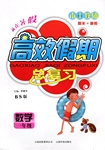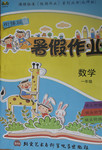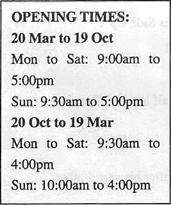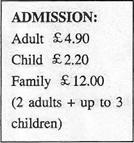题目内容
_______he grew older , he began to go deaf.
| A. As | B.When | C.While | D.With |
A
解析

 本土教辅赢在暑假高效假期总复习云南科技出版社系列答案
本土教辅赢在暑假高效假期总复习云南科技出版社系列答案 暑假作业北京艺术与科学电子出版社系列答案
暑假作业北京艺术与科学电子出版社系列答案 第三学期赢在暑假系列答案
第三学期赢在暑假系列答案It was in the garden of his old house ______ he grew up ______ he dug up a pot of gold.
| A.that; that | B.where; where | C.that; where | D.where; that |
Monty Roberts, owner of a horse ranch (牧场) in San Ysidro, once told us a story. “When a young man was a senior, he was asked to write a paper about what he wanted to __ 36__ and do when he grew up. In his seven-page paper he described his __37__ of someday owning a horse ranch. He drew a __ 38__ floor plan(平面图)for a 4,000-square-foot house that would __ 39__ on a 200-acre dream ranch. Two days later he received his__40__back. On the front page was a __41__red F. The teacher said, “This is an __42__dream for a young boy like you. You have no money. Owning a horse ranch requires a lot of money. ” Then the teacher__43 __, “If you will rewrite this paper with a more realistic goal, I will reconsider your __44__.” The boy asked his father what he should do. His father said, “Look, son, you have to make up your own__45__on this. However, I think it is a very__46__decision for you.” __47__, after a week, the boy__48__the same paper, making no__49__at all. He stated, “You can keep the F and I’ll keep my __50__.”
Monty then turned to us and said, “I tell you this story__51__you are sitting in my 4,000-square-foot house in the middle of my 200-acre horse ranch. I still have that school paper framed (装框) over the fireplace.” He added, “The best part of the __52__is that two summers ago that same schoolteacher brought 30 kids to camp out on my ranch for a week. When the teacher was leaving, he said, “Look, Monty, I can tell you this now. When I was your teacher, I was __53__of a dream stealer. During those years I stole a lot of kids’ dreams. __54__you had enough determination not to give up on yours.”
Don’t let anyone__55__ your dreams. Follow your heart, no matter what.
【小题1】
| A.be | B.find | C.learn | D.see |
| 【小题2】 |
|
| 【小题3】 |
|
| 【小题4】 |
|
| 【小题5】 |
|
| 【小题6】 |
|
| 【小题7】 |
|
| 【小题8】 |
|
| 【小题9】 |
|
| 【小题10】 |
|
| 【小题11】 |
|
| A.Actually | B.Finally | C.Gradually | D.Usually |
| 【小题13】 |
|
| A.comments | B.changes | C.judgment | D.answer |
| 【小题15】 |
|
| 【小题16】 |
|
| 【小题17】 |
|
| 【小题18】 |
|
| A.Fortunately | B.Strangely | C.Curiously | D.Probably |
| 【小题20】 |
|
Driving to a friend’s house on a recent evening, I was attracted by the sight of the full moon rising just above my friend’s rooftop. I stopped to watch it for a few moments, thinking about what a pity it is that most city people --- myself included --- usually miss sights like this because we spend most of our lives indoors.
My friend had also seen it. He grew up living in a forest in Europe, and the moon meant a lot to him then. It had touched much of his life.
I know the feeling. Last December I took my seven-year-old daughter to the mountainous jungle of northern India with some friends. We stayed in a forest rest house with no electricity or running hot water. Our group had campfires outside every night, and indoors when it was too cold outside. The moon grew to its fullest during our trip. Between me and the high mountains lay three or four valleys. Not a light shone in them and not a sound could be heard. It was one of the quietest places I have ever known, a bottomless well of silence. And above me was the full moon, which struck me deeply.
Today our lives are filled with glass, metal, plastic and fiber-glass. We have television,
cell phones, pagers, electricity, heaters and ovens and air-conditioners, cars, computers.
Struggling through traffic that evening at the end of a tiring day, most of it spent indoors, I thought, “Before long, I would like to live in a small cottage. There I will grow vegetables and read books and walk in the mountains. And perhaps write, but not in anger. I may become an old man there, and wear the bottoms of my trousers rolled and measure out my life in coffee spoons. But I will be able to walk outside on a cold silent night and touched the moon.”
【小题1】The best title for the passage would be _________.
| A.Touched by the Moon | B.The Pleasures of Modern Life |
| C.A Bottomless well of Silence | D.Break away from Modern life |
| A.there was too much pollution. |
| B.he failed to see the fullest moon. |
| C.he didn’t adapt to modern inventions |
| D.there were too many accidents on the road. |
| A.No modern equipment. | B.Complete silence. |
| C.The nice moon. | D.The high mountain. |
| A.show that the writer likes city life very much. |
| B.tell us that people greatly benefit from modern life. |
| C.explain that people have less chances to enjoy nature. |
| D.show that we can also enjoy nature at home through them. |
| A.express the feeling of returning to nature. |
| B.show the love for the moonlight. |
| C.advise modern people to learn to live. |
| D.want to communicate longing for modern life. |


 Shakespeare’s period
Shakespeare’s period